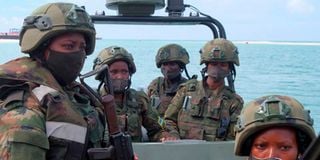Premium
The curse of free mangoes, fish and solar panels in a rebel zone

Rwandan female soldiers patrol on a boat in the port city of Mocimboa da Praia, northern Mozambique, on August 13, 2021.
What you need to know:
- In May to July, when they yellow, the ripeness of the fruits is out of this world.
- The Al-Shabaab rebels use solar panels in their urban and bush camps, so they need the car batteries.
The 100-kilometre drive between the emerging gas district of Afungi, in Mozambique’s northern region where Total Energies is building a massive liquefied natural gas (LNG) project, and the port city of Mocímboa da Praia is memorable.
The project screeched to a halt in March last year, when the Al-Shabaab rebels, aka Islamic State Mozambique, who had roamed and controlled swaths of this Cabo Delgado region for years, moved their attacks to the area. A Rwandan military intervention called in by a beleaguered President Filipe Nyusi has run the rebels out of large parts of Cabo Delgado but they still maraud in the areas under the Southern African Development Community Mission in Mozambique (Samim).
The topography and weather of Cabo Delgado are uncannily, like that of Tanzania’s Tanga region, except this is less touched and, perhaps, a little more fertile. Though most of the area has long been cleared of rebels, for the drive between Afungi and Mocímboa da Praia bulletproof jackets and helmets are still recommended. The extra weight on the head and chest, though, do not cloud the marvel before one’s eyes.
The drive is lined with endless big mango, coconut, orange and cashew nut trees. In May to July, when they yellow, the ripeness of the fruits is out of this world. There is so much of it, apparently, you would need millions of mouths to eat half of it.
Peculiar fascination
The road itself is pristine, built to carry LNG to the port of Mocímboa da Praia — which the rebels trashed. The grass on the side is growing into it and Total is now paying hundreds of people to clear it for about $150 (Sh15,000) a month. In this marginalised region, that is a big deal.
There are dozens of abandoned construction companies and contractor sites, nearly all related to the LNG project, along the road. There is one thing that is unusual though, and that I hadn’t seen in the destruction and looting of war elsewhere in Africa. Rebels and people usually steal the vehicles. In Cabo Delgado, there are yards full of new pick-ups, lorries and sedans that haven’t been touched by looters.
It was so puzzling I was afraid to ask. The explanation came off-handedly from a military officer who said the story of the cars is under the hoods — the most valuable things in the vehicles for both the rebels and people are the batteries and wires in the engine. The rest of the car is largely useless to them. That peculiar fascination has been made by the development in solar panel technology, their falling prices, and solar-powered mobile phones.
The Al-Shabaab rebels use solar panels in their urban and bush camps, so they need the car batteries. The regular folks too, for charging their phones and, in the coastal communities, to power their fishing boat engines. At a camp for internally displaced persons (IDPs), we saw tents with solar panels mounted on their rickety sides.
Advancement in solar panel technology, their increased affordability, and low-end mobile phones, have changed the order of what is important loot in war.
Bewildering array of objects
And those mangoes, oranges, coconuts and cashew nuts are impacting the cost structure of rebellion and relationship with the masses. Rebels cannot live on fruits and nuts alone but can carry them through several months of the year. Where rebels have to live off what farmers grow, the smarter ones usually treat the growers well. If they can get by on wild mangoes and cashew nuts, they don’t have to be as nice and can afford to brutalise them.
This dynamic plays out in a special way at the coast. Mozambique’s Indian Ocean coast at Mocímboa da Praia and places like Palma and Pemba are incredible. During the day when the tide is low, the water recedes far off in the distance, leaving an expansive and bewildering array of objects on the ocean floor. Among them is a lot of fish. Many folks here don’t fish; they pick up fish from the beach. They eat them at home and also sell the catch in the market. Such is the extravagant gifts that nature has bestowed on these troubled lands.
But if your mangoes, oranges, coconuts and fish are going to fall on your lap like manna from heaven, they will create particular unhelpful incentives. You are unlikely to fight like mad to protect them when they are threatened by an enemy because you have little skin in the game. And the government is unlikely to invest much to protect it on your behalf since the political cost of your loss is relatively small.
And then, as a government in these conditions, it is tempting to call a neighbour to come and help to save your neck. Be very afraid of free mangoes, coconut and fish.
Mr Onyango-Obbo is a journalist, writer and curator of the “Wall of Great Africans”. @cobbo3





